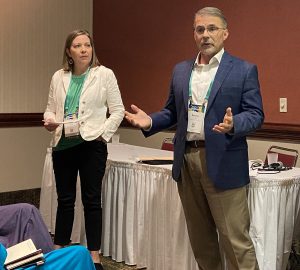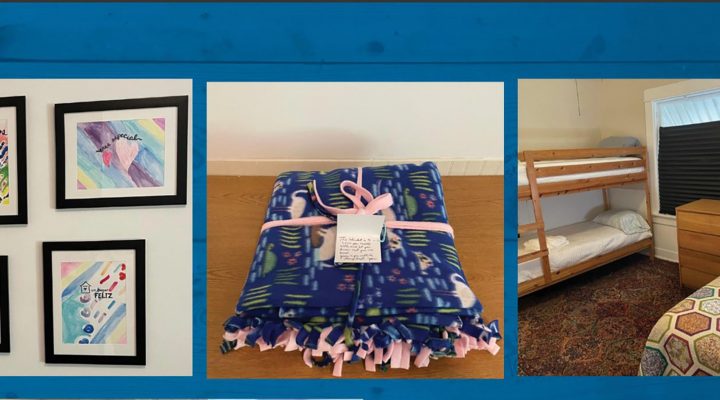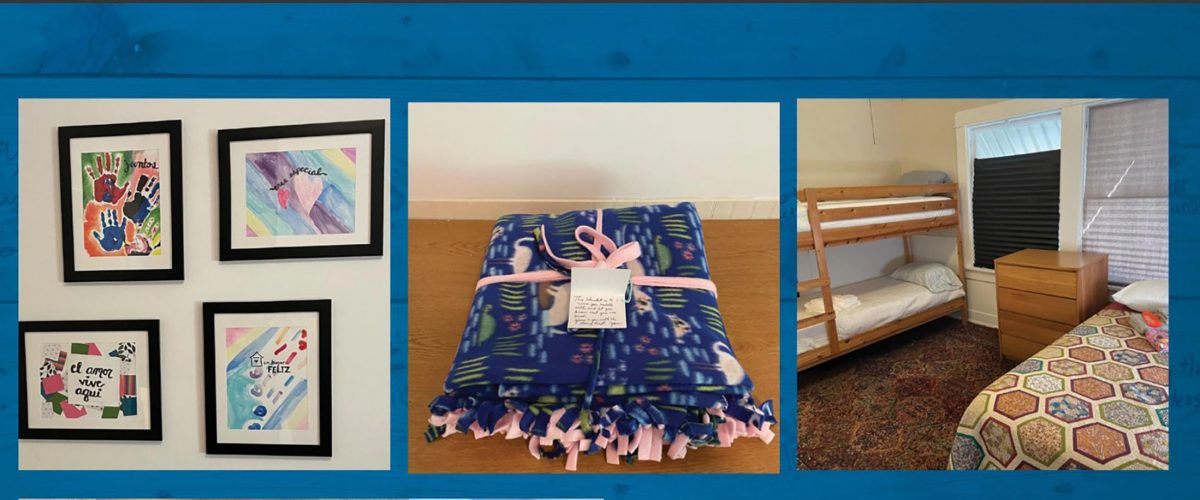A church doesn’t need to be big and rich in order to provide a place of welcome for migrants seeking asylum in America, two members of DaySpring Baptist Church in Waco, Texas, told participants at the Cooperative Baptist Fellowship’s 2024 General Assembly.
Tiffani Harris, the church’s associate pastor for community life, and Dennis Tucker, professor of Christian Scriptures at Baylor University’s Truett Theological Seminary, led a breakout session on “Embracing Angels: A Proven Method to Welcome Asylum Seekers in Our Churches.”

Tiffani Harris (left) and Dennis Tucker tell the story of Naomi House in Waco, Texas.
DaySpring is a 25-year-old contemplative Baptist congregation, Harris reported. The church averages about 250 people in attendance on Sunday mornings, and roughly half of those are under age 18.
Despite its size, the congregation opened a hospitality house — a home for asylum seekers — three years ago.
“You don’t need to be a big church with a big budget and a lot of volunteers to do this,” Harris stressed.
“Opening a hospitality house was a natural outpouring of what has been going on at DaySpring a long time,” she added. “People have come to DaySpring to find renewal.
“So, once we began thinking about opening a hospitality house, it seemed only natural to extend renewal and healing to people coming to our southern border seeking peace and healing.”
“We realized Central America was coming to our border, and we realized we know these people.”
Volunteers from the church had taken mission trips to Central America, she said. As immigration to the United States surged, “we realized Central America was coming to our border, and we realized we know these people.”
DaySpring’s move toward opening a hospitality house progressed through several steps, Tucker explained.
In 2019, the combination of unbearable circumstances in Central America and U.S. immigration policy caused 300 to 400 asylum seekers to stay at San Antonio Mennonite Church each night. John Garland, a friend to many DaySpring members, is pastor of the church, and a group from DaySpring drove down to San Antonio to learn about the Mennonite congregation’s ministry.
“We asked John, ‘What do you need?’” Tucker reported. “John said, ‘A social worker.’ We asked, ‘How much will that cost?’ He said, ‘$25,000.’ … And we raised it.”
About three weeks later, an 18-year-old Central American mother with a new baby arrived in San Antonio. Garland sent a request to DaySpring: “Can someone from your church take in this mom and baby?”
The question hit Tucker squarely. “I realized that either I believe what I teach about God’s care for the poor, or I’ve got to stop,” he said.
“I realized that either I believe what I teach about God’s care for the poor, or I’ve got to stop.”
Tucker and his wife, Tish, and their three daughters, Hannah, Sarah and Hope, decided they were open to sharing their home with the young mother, Carla, and her baby.
In the fall of 2019, the mom and daughter moved in with the Tuckers. His voice cracked when he told breakout participants what Carla said when she and her baby moved in: “My pastor in Honduras said the church would take care of us.”
“We had said we would do this if the church would help us,” Tucker recalled. So, every Saturday, church members completed a spreadsheet for all the volunteer opportunities to help the Tuckers help the little family.
The Tuckers’ — and DaySpring’s — relationship with Carla and her daughter propelled the church to begin asking how they could go about opening a home that could help more asylum seekers.
“When the Tucker family opened their home to Carla, we had to figure out all the things our asylum-seeker friends have to figure out,” Harris said. “We learned about all the gaps in the asylum process. For example, if you’re a woman with a child, there is not much for you, especially in order to work and also to protect your children.
“We asked, ‘Who are the most vulnerable people in our society?’ Of course, women and children seeking asylum.”
As they pondered the possibilities, they latched onto the biblical story of the Hebrew woman Naomi and her Moabite daughter-in-law, Ruth, whose husbands died, and they immigrated back to Judah, Harris said.
“In the midst of grief, they stayed together and found restoration and community,” she noted. “That’s why we named our home Naomi House.”
As mission leaders in the congregation planned for the house, “we conducted an open and transparent process and brought as many people as possible along with us,” she said. They conducted congregational learning, listening and visioning sessions. They listened to partner churches, seeking to clarify their goals.
“We developed clear vision and parameters. We focused on what we could and couldn’t do,” Harris said. “We knew we had to be all in. It took a couple of years.”
“As a small church, we had a good volunteer base, but we knew we needed help,” Tucker said. So, they conducted an ecumenical outreach to other Waco churches and social-service/immigration agencies. They also developed an “asset map” of resources in Waco that are available to asylum seekers and to the church as it aids them.
“None of us could do this alone,” he said.
And that particularly included the help of other churches, Harris added, noting, “I’m not sure we would have had the courage to do this without their encouragement. We saw that we don’t have to do it all.”
They drafted a community covenant to guide their work. It pledges:
- To receive one another as Christ in our midst
- To enact Christian hospitality
- To treat one another with dignity and respect
- To participate in and share common meals
- To address conflict in a way that honors one another and God
- To receive the house as a gift from God
- To pray for one another
They found a facility that would work for housing multiple asylum-seeking families. Seven partner churches helped DaySpring “reclaim” the house and clean up the lot.
They divided volunteers into leadership, hospitality, well-being and support teams to spread the workload, Harris said. “We had to set boundaries to survive,” she added. “We want the model to be sustainable, and it must work for our church, too.”
Along the way, support for Naomi House — including financial resources — has remained sufficient to the task.
“We have been remarkably surprised how generous people are when they see things that make a difference,” Tucker said. “You’re letting people be what they always want to be. … It has changed us. It has changed our church.”
Related articles:
Once again, immigrant advocates damn Bidens new policy
Hasta la vista! Title 42, but hola! more restrictions
Are brown-skinned migrants waiting at the border less worthy of asylum than white-skinned Ukrainians? I Opinion by Stephen Reeves
Religion, race and politics are key factors in attitudes on welcoming refugees


